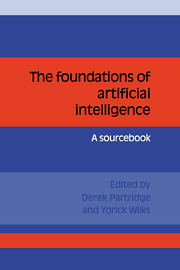Book contents
- Frontmatter
- Contents
- List of contributors
- Preface
- Acknowledgments
- 1 Introduction
- 2 The formal foundations of AI
- 3 Levels of theory
- 4 Programs and theories
- 5 The role of representations
- 6 The role of programs in AI
- 7 Rational reconstruction as an AI methodology
- 8 Is AI special in regard to its methodology?
- 9 Does connectionism provide a new paradigm for AI?
- 10 The role of correctness in AI
- 11 Limitations on current AI technology
- 12 Annotated bibliography on the foundations of AI
- Index of names
7 - Rational reconstruction as an AI methodology
Published online by Cambridge University Press: 03 May 2010
- Frontmatter
- Contents
- List of contributors
- Preface
- Acknowledgments
- 1 Introduction
- 2 The formal foundations of AI
- 3 Levels of theory
- 4 Programs and theories
- 5 The role of representations
- 6 The role of programs in AI
- 7 Rational reconstruction as an AI methodology
- 8 Is AI special in regard to its methodology?
- 9 Does connectionism provide a new paradigm for AI?
- 10 The role of correctness in AI
- 11 Limitations on current AI technology
- 12 Annotated bibliography on the foundations of AI
- Index of names
Summary
Rational reconstruction (reproducing the essence of the program's significant behavior with another program constructed from descriptions of the purportedly important aspects of the original program) has been one approach to assessing the value of published claims about programs.
Campbell attempts to account for why the status of AI vis-a-vis the conventional sciences is a problematic issue. He outlines three classes of theories, the distinguishing elements of which are: equations; entities, operations and a set of axioms; and general principles capable of particularization in different forms. Models in AI, he claims, tend to fall in the last class of theory.
He argues for the methodology of rational reconstruction as an important component of a science of AI, even though the few attempts so far have not been particularly successful, if success is measured in terms of the similarity of behavior between the original AI system and the subsequent rational reconstruction. But, as Campbell points out, it is analysis and exploration of exactly these discrepancies that is likely to lead to significant progress in AI.
The second paper in this section is a reprint of one of the more celebrated attempts to analyse a famous AI program. In addition, to an analysis of the published descriptions of how the program works with respect to the program's behaviour (Lenat's ‘creative rediscovery’ system AM), Richie and Hanna discuss more general considerations of the rational-reconstruction methodology.
- Type
- Chapter
- Information
- The Foundations of Artificial IntelligenceA Sourcebook, pp. 235 - 236Publisher: Cambridge University PressPrint publication year: 1990



